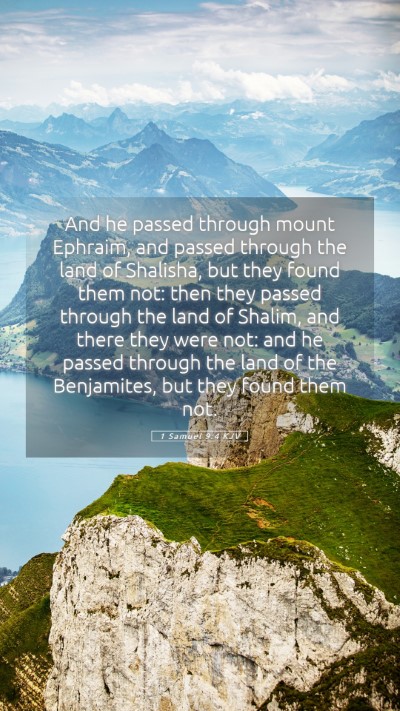Meaning and Interpretation of 1 Samuel 9:4
Bible Verse: 1 Samuel 9:4 - "And he passed through Mount Ephraim, and through the land of Shalisha, but they found him not: then they passed through the land of Shaalim, and there they found him not. And he passed through the land of Benjamin, but they found him not."
Overview
This verse narrates a part of the story where Saul, accompanied by a servant, embarks on a quest to find his father's lost donkeys. Their journey through several regions reflects not only a physical search but also sets the stage for Saul's eventual anointing as king. Understanding this passage within its context is essential for grasping its overall significance in Scripture.
Insights from Public Domain Commentaries
-
Matthew Henry
Contextual Analysis: Henry notes that this journey serves as a means to prepare Saul for his divine appointment. The wandering from place to place illustrates the futility of relying solely on human efforts in the face of divine guidance. It highlights the idea that God often uses ordinary circumstances to position individuals for extraordinary purposes.
Theological Insights: Henry emphasizes the importance of recognizing God's hand in what may seem like trivial pursuits. The search for donkeys is not just a mundane task; it is divinely orchestrated to lead Saul to a significant encounter that alters the course of Israel's history.
-
Albert Barnes
Geographical Significance: Barnes provides commentary on the regions mentioned, suggesting that the journey's geography symbolizes the extensive search undertaken. Each location reflects a layer of the search, indicative of the depth of Saul’s commitment to his duty.
Spiritual Lessons: Barnes points out that the verse illustrates the idea of searching for lost things, mirroring humanity's quest for purpose and direction. The inability to find the donkeys allegorizes the struggle of individuals who seek fulfillment apart from divine will.
-
Adam Clarke
Historical and Cultural Context: Clarke offers insights into the societal backdrop of Saul's narrative, reflecting on the importance of agricultural underpinnings in Israelite culture. The lost donkeys symbolize the everyday concerns of the people, reiterating the relevance of God in all aspects of life.
God's Sovereignty: Clarke highlights that even in mundane tasks, God's plans are at work. This is a reminder that what may seem like happenstance may be a part of a larger divine scheme.
Thematic Elements
- Divine Guidance: This verse demonstrates how God leads individuals through seemingly ordinary events towards His larger purpose.
- Search and Discovery: The search for the lost donkeys represents the universal human experience of searching for meaning and direction in life.
- Preparation for Leadership: This episode prepares Saul for a pivotal role as king, emphasizing that leadership often arises from humble beginnings.
Application and Implications
For those engaging in Bible study and interpretation, this passage encourages reflection on how God often utilizes everyday situations to lead us into our destinies. It serves as a reminder for believers to seek God’s guidance in every pursuit, understanding that even our mundane activities may have significant spiritual implications.
Related Bible Cross References
- 1 Samuel 10:1 - The anointing of Saul as king.
- Proverbs 16:9 - "A man's heart deviseth his way: but the LORD directeth his steps."
- Luke 19:10 - "For the Son of man is come to seek and to save that which was lost."
Further Study and Reflection
This passage encourages further Bible study on the roles of humble tasks in achieving God's plans. It may also serve well in Bible study groups where believers can discuss how God moves in their daily lives.
As you reflect on 1 Samuel 9:4, consider the ways God may be guiding your life through ordinary circumstances.


